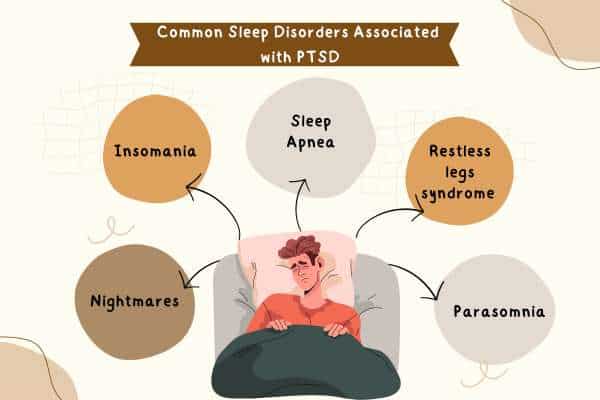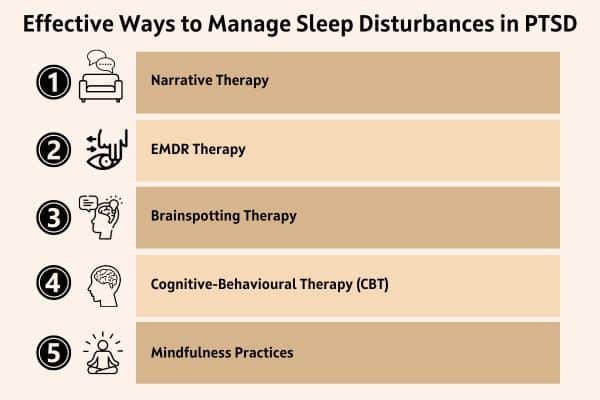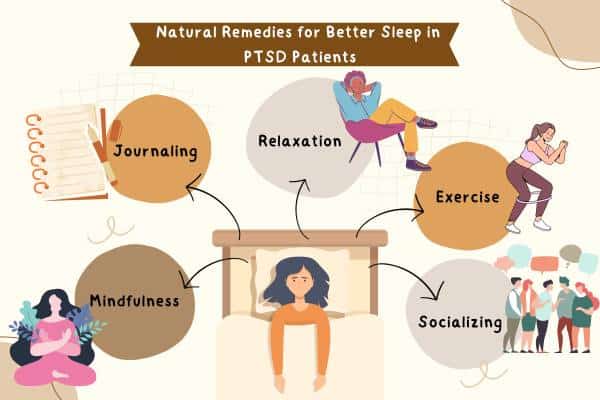What is PTSD?
PTSD, or Post-Traumatic Stress Disorder, is a mental health condition triggered by experiencing or witnessing a traumatic event. This disorder can manifest through intense, disturbing thoughts and feelings related to the trauma long after the event has ended. Individuals with PTSD may relive the event through flashbacks or nightmares, feel sadness, fear, or anger, and may feel detached or estranged from other people. These symptoms can significantly impact daily functioning and quality of life, making it essential to understand and address the disorder comprehensively. Click the links to explore more about PTSD or Complex PTSD.
The Impact of PTSD on Sleep Quality
As someone who has worked extensively with individuals suffering from PTSD, I’ve seen firsthand how profoundly this condition can affect sleep. PTSD, or Post-Traumatic Stress Disorder, doesn’t just haunt a person during the day—it seeps into the night, disrupting sleep quality and leading to a host of sleep disorders. The effects of PTSD on sleep quality are often overlooked, yet they play a critical role in a person’s overall well-being.
Take Ravi, for instance, a 35-year-old Indian gentleman who came to me after years of struggling with PTSD following a traumatic car accident. Ravi experienced frequent nightmares, a common manifestation of PTSD and sleep disorders. These nightmares made it nearly impossible for him to maintain consistent sleep patterns, leading to chronic insomnia. Ravi’s experience is not uncommon among those dealing with PTSD, and understanding the relationship between PTSD and sleep disturbances is crucial for effective treatment.
Common Sleep Disorders Associated with PTSD
PTSD and sleep disorders are closely linked. Individuals with PTSD often report a range of sleep disturbances, including insomnia, nightmares, and sleep apnoea. Insomnia, particularly, is prevalent, with many PTSD sufferers finding it difficult to fall asleep or stay asleep. For Mei Ling, a young Chinese woman who survived a traumatic event during her childhood, the impact of PTSD on sleep was evident in her persistent inability to sleep through the night. Her PTSD-related sleep disturbances often left her exhausted, affecting her day-to-day life.
Nightmares and PTSD are another common pairing. These vivid, distressing dreams are more than just unpleasant—they can cause a person to wake up multiple times a night, preventing restorative sleep. Over time, the lack of proper sleep can lead to other health issues, compounding the challenges faced by PTSD sufferers.
How PTSD Disrupts Sleep Patterns
The impact of PTSD on sleep extends beyond just difficulty falling or staying asleep. PTSD can cause disruptions in the sleep cycle, leading to poor sleep quality. People like Ahmad, a client in his 40s who struggled with PTSD after military service, often find their sleep is fragmented. This fragmentation prevents them from reaching the deeper stages of sleep that are essential for physical and mental recovery.
PTSD-related sleep disturbances are not just a by-product of anxiety or stress—they’re deeply intertwined with the body’s physiological response to trauma. The hyperarousal state often seen in PTSD sufferers keeps the body on high alert, making it hard to relax enough to sleep. This constant state of vigilance contributes significantly to sleep disturbances in PTSD.
Effective Ways to Manage Sleep Disturbances in PTSD
Since I work with EMDR therapy, let me first talk about the same. Effective management of sleep disturbances in PTSD can be achieved through EMDR therapy, a powerful technique that helps reprocess traumatic memories. By targeting the root causes of distressing thoughts and emotions, EMDR can significantly reduce nightmares and improve sleep quality. Through a series of guided eye movements, the therapy helps the brain reframe traumatic memories, leading to a calmer, more restful state of mind. Many individuals find that with regular EMDR sessions, their sleep disturbances decrease, allowing for more restorative sleep.”
In addition to EMDR therapy, several other therapeutic modalities can be effective in managing sleep disturbances associated with PTSD:
- Hypnotherapy: This approach uses guided relaxation, focused attention, and concentrated mindfulness to help individuals access their subconscious mind. Hypnotherapy can address the underlying trauma and reduce sleep disturbances by promoting relaxation and altering negative thought patterns.
- Brainspotting Therapy: Like EMDR, Brainspotting is a focused treatment method that identifies and processes sources of trauma and emotional pain through eye positioning. It helps in releasing deep-seated trauma, leading to improved sleep quality.
- Systematic Desensitization with Hypnotherapy: This combines relaxation techniques with gradual exposure to trauma-related memories or stimuli, helping individuals become less sensitive to triggers that disrupt sleep.
- Cognitive Behavioural Therapy for Insomnia (CBT-I): This is a structured program that helps individuals address the thoughts and behaviours that contribute to insomnia. CBT-I is particularly effective in reducing the impact of PTSD-related sleep disturbances by changing negative sleep patterns and improving sleep hygiene.
- Somatic Experiencing: This approach targets the body’s physiological reactions to trauma. By releasing the energy stored in the body from traumatic experiences, Somatic Experiencing can help alleviate symptoms of PTSD, including sleep disturbances.
- Mindfulness-Based Stress Reduction (MBSR): This approach combines mindfulness meditation and yoga to help individuals become more aware of their thoughts, feelings, and bodily sensations. MBSR can reduce stress and anxiety, leading to better sleep.
- Narrative Therapy: This involves reshaping the story or narrative that individuals talk about their traumatic experiences. By reauthoring their story in a more empowering way, individuals can reduce the emotional charge of the trauma, which can, in turn, improve sleep.
Each of these modalities can be tailored to the individual’s needs and combined to create a comprehensive treatment plan for managing sleep disturbances in PTSD.
Pharmacotherapy, while not a first-line treatment, can also be considered for managing severe sleep disturbances in PTSD patients. Medications like prazosin have been shown to reduce nightmares in some individuals, providing relief for those who haven’t responded to other treatments.
Please be aware: I am not recommending any medications. You should only take medications under your doctor’s supervision.
Natural Remedies for Better Sleep in PTSD Patients
Natural remedies can also be beneficial in managing sleep disturbances caused by PTSD. Techniques like mindfulness meditation, progressive muscle relaxation, and deep breathing exercises can help calm the mind and body, making it easier to fall asleep. Herbal supplements, such as valerian root and chamomile, are also popular for their calming effects.
Lily, found that incorporating a nightly meditation routine helped reduce her anxiety levels, leading to better sleep. It’s important to note that while natural remedies can be helpful, they should be used alongside other treatments and under professional guidance to ensure they’re safe and effective.
Creating a Sleep-Friendly Environment
Creating a sleep-friendly environment is another key strategy for improving sleep quality in PTSD sufferers. This involves making the bedroom a calm, comfortable space that promotes relaxation. Simple changes like reducing noise and light, keeping the room cool, and investing in a comfortable mattress and pillows can make a significant difference.
For PTSD sufferers like Raj, who struggled with nightmares, these adjustments were crucial. By making his bedroom a sanctuary for sleep, Raj was able to improve his sleep quality and reduce the frequency of his nightmares.
Improving sleep quality in PTSD sufferers is a vital part of the healing process. The relationship between PTSD and sleep disturbances is complex, but with the right combination of therapies, treatments, and lifestyle changes, it’s possible to manage these issues effectively. Whether through CBT-I, EMDR therapy, or natural remedies, there are numerous ways to address PTSD-related sleep disorders and improve overall well-being.
If you or someone you know is struggling with PTSD and sleep disorders, it’s important to seek help. At Insightful Counselling, we offer a range of therapies designed to address both the psychological and physiological aspects of PTSD, helping you achieve better sleep and a better quality of life.
Reference:
- National Institute of Mental Health (NIMH)
Provides detailed information on PTSD, its symptoms, and treatments.
Website: https://www.nimh.nih.gov - American Psychological Association (APA)
Offers insights into the psychological impacts of PTSD and its link with sleep disorders.
Website: https://www.apa.org - Sleep Foundation
Contains articles and studies on how PTSD affects sleep and practical sleep management strategies.
Website: https://www.sleepfoundation.org - Mayo Clinic
Provides a comprehensive overview of PTSD symptoms, including sleep-related issues.
Website: https://www.mayoclinic.org - PubMed Central (PMC)
Hosts peer-reviewed articles on the relationship between PTSD and sleep disturbances.
Website: https://www.ncbi.nlm.nih.gov/pmc/ - American Academy of Sleep Medicine (AASM)
Includes research on effective treatments for PTSD-related sleep disorders.
Website: https://aasm.org - Harvard Health Publishing
Offers easy-to-understand content on the impact of PTSD on sleep and mental health.
Website: https://www.health.harvard.edu












